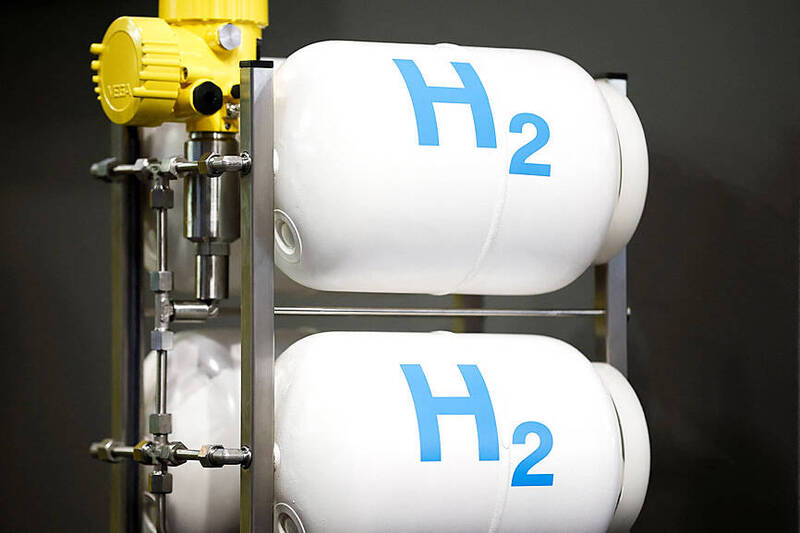Business
Taiwan Develops Low-Carbon Hydrogen Certification Bill for Global Standards

The Ministry of Economic Affairs in Taiwan has drafted a bill aimed at establishing guidelines for the certification of domestic low-carbon hydrogen sources. This initiative is designed to align with international standards and foster a renewable-friendly supply chain. The bill is expected to complement the existing Taiwan Renewable Energy Certificate (T-REC) system, preventing overlapping disclosures.
During the recent UN Climate Change Conference (COP28) in 2023, representatives from 37 countries committed to developing national low-carbon hydrogen certification mechanisms based on mutual recognition. In May, the Bureau of Standards, Metrology and Inspection completed the draft guidelines and initiated a memorandum of understanding with a technical support team from the European Union’s Association of Issuing Bodies. This collaboration aims to ensure that Taiwan’s draft guidelines align with EU voluntary certification schemes.
Key Components of the Certification Guidelines
The preliminary structure of the guidelines includes essential technical aspects such as the format for certificate issuance, information disclosure items, cancellation procedures, and the boundaries for carbon emissions inventories. The Ministry of Economic Affairs anticipates that detailed regulations for low-carbon hydrogen source certification will be established by 2024.
According to Hsu Chia-wen, an assistant researcher at the Taiwan Institute of Economic Research, low-carbon hydrogen is crucial for decarbonizing energy-intensive industries. “The certification mechanisms can provide clean hydrogen with an identifier that meets international standards,” Hsu noted. This certification would incentivize companies to adopt low-carbon hydrogen and accelerate the transition to sustainable energy.
An anonymous expert from the institute emphasized the role of economic incentives and compliance requirements in driving market demand for low-carbon hydrogen. Robust certification mechanisms would enhance international clean hydrogen markets, allowing for the verification and trading of the environmental value of low-carbon hydrogen.
Once the Ministry’s guidelines are implemented, hydrogen’s market value will hinge on verifiable environmental attributes. Companies will be required to provide comprehensive data on greenhouse gas emissions associated with hydrogen production, including electricity sources, energy consumption during production, and emissions from raw materials and transport.
Integration with Existing Energy Certification Systems
Taiwan employs the T-REC system, which focuses on electricity sources and renewable energy use. The low-carbon hydrogen certification system is designed to complement T-REC by evaluating the carbon intensity and life-cycle emissions of hydrogen or hydrogen-based fuels. This integration is intended to ensure that the environmental benefits of renewable electricity are disclosed only once.
For companies utilizing hydrogen, these certification mechanisms will be critical to their international sustainability initiatives and supply chain transparency. Various sustainability frameworks, including the RE100 initiative, the Carbon Disclosure Project, and the Corporate Sustainability Reporting Directive, require firms to disclose their energy sources and contributions to decarbonization.
Firms lacking credible certification for hydrogen energy sources may find themselves at a competitive disadvantage when vying for international contracts. They could also face higher tariffs on exports to the EU due to its carbon border adjustment mechanism, which penalizes goods based on their carbon emissions.
Taiwan plans to adopt a progressive approach in promoting its low-carbon hydrogen certification mechanism, initially emphasizing the domestic use of power and fuels, as well as emissions during production processes and pre-delivery operations. Imported raw materials and emissions from overseas transport will be integrated into the certification process at a later stage, thereby alleviating pressure on domestic industries.
This initiative positions Taiwan at the forefront of the global shift toward sustainable energy solutions, supporting its commitment to international climate goals while enhancing the competitiveness of its hydrogen market.
-

 Lifestyle4 months ago
Lifestyle4 months agoHumanism Camp Engages 250 Youths in Summer Fest 2025
-

 Business4 months ago
Business4 months agoKenvue Dismisses CEO Thibaut Mongon as Strategic Review Advances
-

 Sports4 months ago
Sports4 months agoDe Minaur Triumphs at Washington Open After Thrilling Comeback
-

 Top Stories4 months ago
Top Stories4 months agoColombian Senator Miguel Uribe Shows Signs of Recovery After Attack
-

 Sports4 months ago
Sports4 months agoTupou and Daugunu Join First Nations Squad for Lions Clash
-

 Health4 months ago
Health4 months agoNew Study Challenges Assumptions About Aging and Inflammation
-

 World4 months ago
World4 months agoASEAN Gears Up for Historic Joint Meeting of Foreign and Economic Ministers
-

 Business4 months ago
Business4 months agoOil Prices Surge Following New EU Sanctions on Russia
-

 Entertainment4 months ago
Entertainment4 months agoDetaşe-Sabah Violin Ensemble Captivates at Gabala Music Festival
-

 Entertainment4 months ago
Entertainment4 months agoBaku Metro Extends Hours for Justin Timberlake Concert
-

 Business4 months ago
Business4 months agoU.S. House Approves Stablecoin Bill, Sends to Trump for Signature
-

 Top Stories4 months ago
Top Stories4 months agoRethinking Singapore’s F&B Regulations Amid Business Closures









